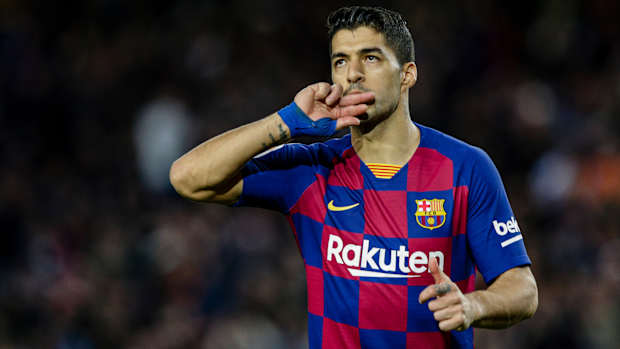Pairing Luis Suarez with Diego Costa under Diego Simeone seems like the most fitting Atlético Madrid move, and it could come back to haunt Barcelona.
In retrospect, there was something almost inevitable about Luis Suárez moving to Atlético Madrid. Rarely do a club and player seem so temperamentally suited to each other: a forward committed to scoring by any means necessary inserted into a team that embodies the outlook of a coach, Diego Simeone, who was brought up in the best traditions of anti-fútbol in Argentina. Victorio Spinetto, the early youth coach who gave him the nickname “Cholo,” was the man whose football led to the invention of the term.
Suárez is 33, and his impact has diminished in recent seasons. It was no great surprise that when Ronald Koeman, who took over as Barcelona coach this summer, decided he was not part of his plans—although what that means for Koeman’s relationship with Suárez’s great friend Lionel Messi is unclear. A termination of his contract was agreed on Monday, although there is little sense that negotiations have been amicable.
The Uruguayan had been expected to join Juventus, which has been linked with pretty much every aging forward in the market this summer. It's as though the demand for a like-for-like replacement for Gonzalo Higuaín, who has joined Inter Miami, has been taken rather too literally. Suárez even went to Perugia last week to take an Italian exam that allowed him to secure an Italian passport and dual-nationality as Juventus had already hit its maximum quota of non-EU players after signing Brazilian midfielder Arthur and U.S. international Weston McKennie.
That exam has been at the center of one of the more bizarre offshoots of this saga, with an investigation into whether it was fixed currently taking place in Perugia.
(In another bizarre twist, reporting of Suárez’s arrival in Perugia also led to apparently false rumors that the U.K. prime minister Boris Johnson had been in Perugia last week as well. It provoked speculation he had been visiting the recently ennobled Evgeny Lebedev, a confidante, newspaper owner and the son of a former KGB operative, who owns a restored castle in the area and owns a pet wolf called Boris; it turned out it was former British Prime Minister Tony Blair who had passed through the airport.)
Beyond all of that, Barcelona reportedly stalled on allowing Suárez to leave for free once it became clear that Atletico Madrid was going to be his destination, but things were evidently sorted in a civil-enough manner, with all parties reaching a financial agreement of €6 million in variables to pave the way for Wednesday's move.
So Suárez will remain in Spain, with Juventus taking Álvaro Morata from Atlético Madrid on a yearlong loan with an option to buy instead. The 27-year-old Morata first joined Juventus from Real Madrid in 2014 and had an impressive two seasons there before returning to Madrid, where he scored 15 goals in 26 league games prior to his move to Chelsea. He never seemed at home in the Premier League, though, and a season at Atlético was only intermittently successful.
That Suárez at his peak was a more effective forward than Morata can hardly be doubted, but when considering a thirty-something forward pairing of Suarez and Diego Costa, it’s tempting to conclude opposing defenders may be less concerned than referees. Still, the move is a risk for Barcelona, however obvious it may be that Suarez was a player who needed to be offloaded. At least if he had moved to Juventus and rediscovered his best form, he would have been scoring in a foreign league. At Atleti, there’s a serious danger Suarez will embarrass Koeman by scoring against Barcelona—particularly given he is one of those players who appears to gain additional motivation when playing against those he feels have wronged him.
There must be doubts, though, as to whether Suárez will reignite in Madrid. Simeone demands effort; victory comes through suffering. Although the younger Suárez would have subscribed to that, he was not conspicuously industrious last season at Barcelona. It may be he is at an age when pace and fitness never fully return and that Simeone ends up having to use him sparingly.

If offloading Suárez was necessary for Barcelona, the news that Koeman sees no immediate future for Riqui Puig is more surprising. The 21-year-old midfielder had seemed like one of the more promising recent La Masia graduates, and Koeman is a far more pragmatic manager than many steeped in the traditions of Barcelona. The most likely outcome is for him to be loaned out while the Koeman revolution takes shape.
What is clear already is that the rebuilding of the club will not be easy. It will not come without controversy. Koeman is admirably thick-skinned and to that extent is ideal for the job; he is unlikely to allow public or media outrage to deflect him. But with presidential elections scheduled for next year with a possibility they will be brought forward, his position already feels under threat. And it won’t help him if Suárez suddenly starts scoring goals for Atlético.